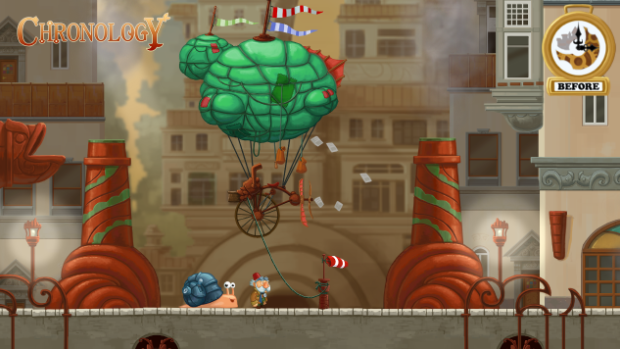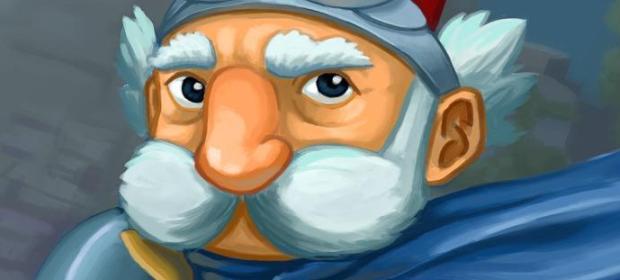Platform games are rarely just that nowadays. Straightforward jumping games are few and far between and developers are looking for ever more interesting hooks and gimmicks to make their games stand out, be that the save and replay features found in Braid, the story-driven, emotional gameplay of something like Spate, or even good old Mario making the move to 3D with integrated touch-screen features. The rise of independent development into a more prominent position has certainly pushed creators to be more imaginative and innovative than before.
Chronology takes solid platforming action, and adds to it a time-travelling feature which is used to solve puzzles and progress through the game. Playing as the aged Inventor and the mysterious giant snail whom he meets upon his journey, the two must travel back in time to help prevent the catastrophic events of the past. The Inventor once worked with his mentor to create a safe and endless power source that would help the whole world but, corrupted by power, his mentor went too far and caused a series of events that levelled cities and killed thousands. Now with the help of his shell-carrying friend, he sets out to stop the disaster from ever taking place.

Two playable characters means two main gameplay mechanics to take into account. The Inventor can use a time-travel device to instantly switch between present day and the past with the touch of a button, which you will have to make use of almost constantly to navigate platforms and solve puzzles. For instance, in the present, the world is overgrown with plants and in a state of decay, whereas in the past everything is clean and the world is a steampunk paradise.
So say the Inventor stumbles upon a broken lift, he may only have to travel back in time to find the same lift in working order. Conversely, planting a seed in the past may yield a fully grown vine to climb once you travel to the present-day. These puzzles are clever and require lateral thinking and some quick reflexes to switch between time zones. None of the puzzles are real stumpers, but a few will certainly require a bit of trial and error before you discover the solution.

On top of the time-travelling, when you switch to control the snail, you can pause time. Of course, this skill won’t pause our two heroes, but rather any enemies, moving platforms or projectiles. This must also be timed wisely in order to navigate certain areas, and several puzzles call for a combination of all of your skills together. Thankfully, the hot-switching between the Inventor and snail is so smooth and instantaneous that few of the puzzles will cause much difficulty to even players with poor reactions, but many will require a little planning and fore-thought in order to determine which powers to use and when.
Because most of the puzzles are fairly logical and not especially time-sapping, Chronology actually ends up being a rather short title. The game consists of around eight chapters, but will only take the average player a couple of hours to complete. Of course this is a low-price independent release, so we don’t expect a title of epic proportions, but unlike other time-based platformers such as Braid, there is no deep psychological storyline hidden behind the narrative, nor any additional challenges or achievements to attain. You will have experienced absolutely everything the game has to offer in a single play-through, with nothing left to discover on repeat visits.

The combination of both the Steampunk world of the past and natural one of the future are quite visually interesting, although the art style is fairly simple. The hand-drawn backgrounds and colourful, bold character sprites are attractive, but lack the design flair to lift them off the screen and really bring them to life. The music is a similar story too, whereby it sets the tone quite nicely and matches the atmosphere, but sadly blends into the background rather than really enhancing the experience.
VERDICT: Aside from the short length, there isn’t much that Chronology does wrong. The platforming is competent and it controls pretty solidly; the puzzling is well thought-out and intuitive, and the gameplay interesting and varied. But none of the elements truly excel either, leaving you with the feeling that, whilst enjoyable, this is a game that could have been great were a few more risks taken. That is not to say that Chronology isn’t a fun distraction, it is just one that will most likely be quickly forgotten.

GOOD. A game that scores 7/10 is worthy of note, but unworthy of fanfare. It does many things well, but only a few of them incredibly well and, despite a handful of good qualities, fresh ideas and solid mechanics, it fails to overwhelm.
Review code provided by publisher.






